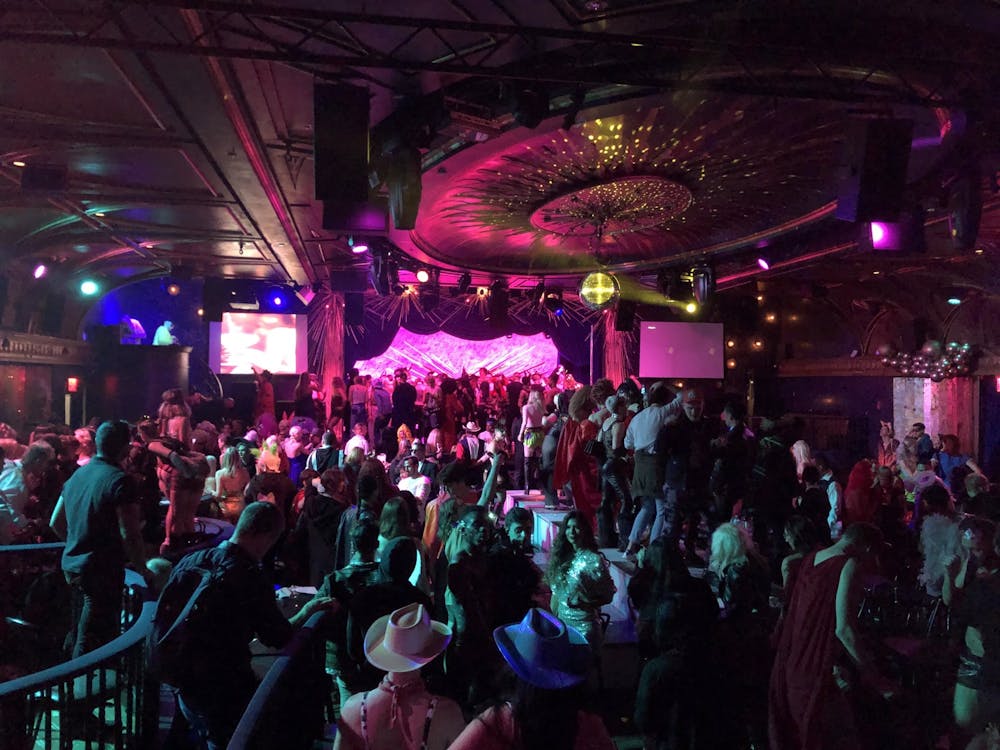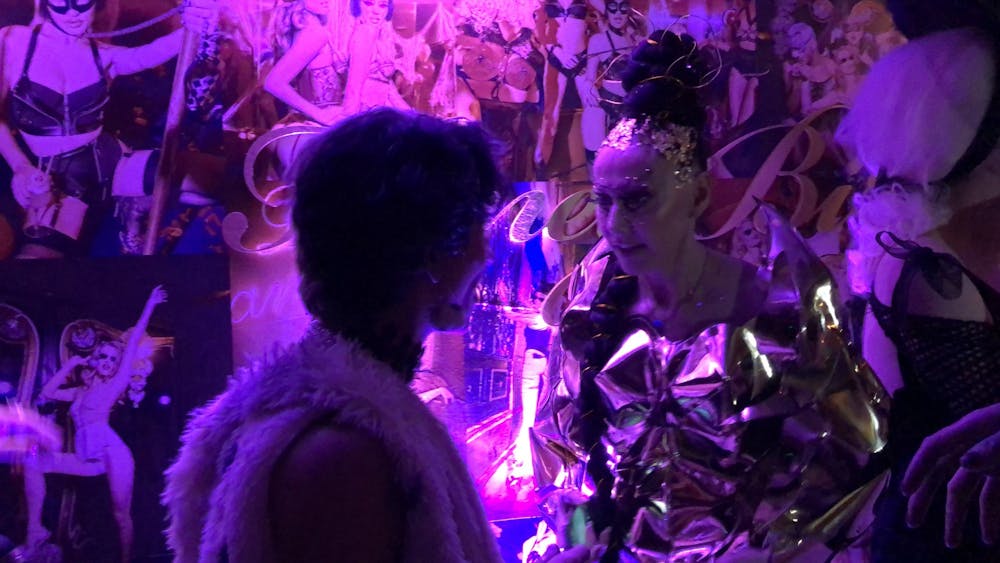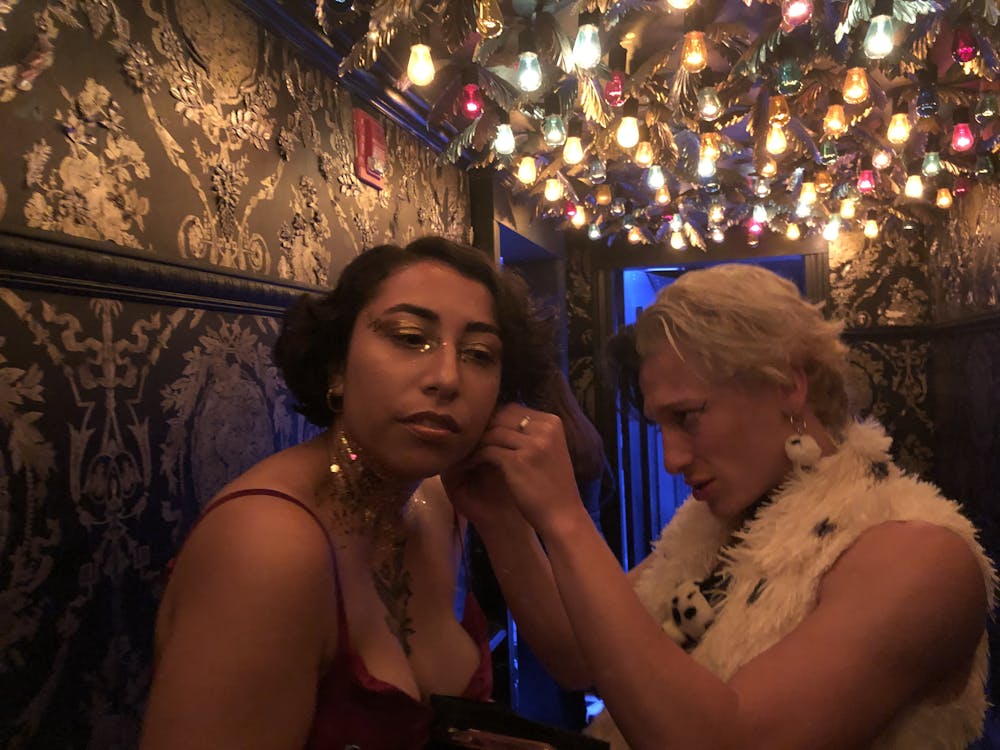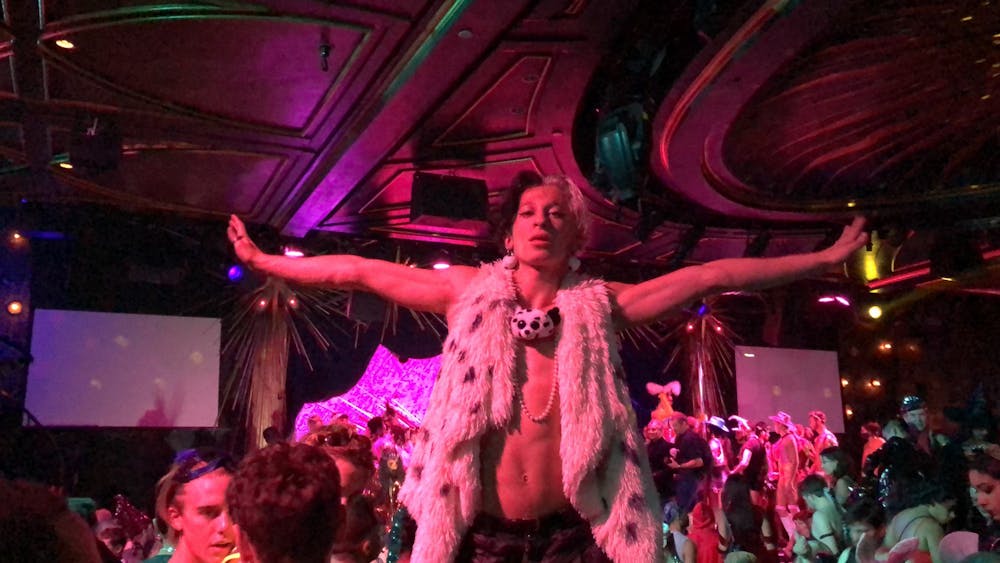It’s 2 a.m. A pop-house remix of Gloria Gaynor’s “I Will Survive” is playing loud enough to make your teeth chatter. And the pride of Princeton diving is plunging into a crowd of 600-odd fully vaccinated, mostly queer, and scarcely clothed partygoers in Midtown Manhattan.
As tequila-powered dancers stumble through the strobe-obsessed basement venue, Griffin Maxwell Brooks ’23 literally rises above it. Wearing little more than an oversized white faux-fur vest and tight-fitting black leather pants, they grab hold of their necklaces (one pearl and one a Beanie Baby Dalmatian head), lean against my shoulder, and hoist themself atop a table.
Brooks is a paradox. Unapologetically queer and expressive, their larger-than-life wardrobe and personality stand out among the clean-cut khaki of Princeton, N.J. All the same, balancing a rocket scientist’s course rigor with the demands of a Division I sport are hardly the norm in New York City’s queer nightlife scene. For Brooks, life itself is a contradiction in terms, a never-ending balancing act of remarkably disparate identities.
“I am me,” they told me. “Queer, genderfluid, gay, all of those things, on a men’s varsity athletic team at Princeton. It’s funny, I wouldn’t call myself not a walking dichotomy.”
A junior majoring in mechanical and aerospace engineering, Brooks’ ascendance to New York nightclub notoriety took hold through TikTok. The self-described “digital club kid” carved a niche of comedy, fashion, and social justice rooted in their queer identity, earning @griffinmaxwellbrooks (they always go by their “government name”) over 980,000 followers.
“Social media [is] a place where I can express my ideas and philosophies and show people my life,” explained Brooks, who identifies as non-binary, gay, and genderfluid.
Brooks’ daily TikToks garner hundreds of thousands of views and offer a glimpse into their label-defying personality. Boasting a brand of affirmational positivity, tongue-in-cheek confidence, and fiercely independent expression, they’re a digital flagbearer for Gen Z’s queer community.
While Brooks’ public persona appears effortless and easy-going, their stature as a young, queer public figure often invites challenging private conversations.
“My DMs are full of people saying ‘you helped me figure out that I’m non-binary, you helped me figure out that I’m gay or that I’m this, that I’m that, or just helped me be more comfortable in my own body,’” they said.
“Does that weigh on you?” I asked.
“A little bit. I think that the part of it that’s a compliment seriously outweighs the worry.”
“What’s the worry?”

“The worry [is] that I’m steering people wrong, but I’ve never felt like I’m steering people wrong. The notion that I’m steering people wrong only ever comes out of the mouths of people whose perspective on queer people may be not the most politically correct,” they responded.
Brooks expanded their persona beyond the internet in the summer of 2021, launching into queer nightlife and quickly becoming a regular at Manhattan parties thrown by the legendary event producer Susanne Bartsch.

A view from inside the Bartschland event venue.
Sam Kagan / The Daily Princetonian
“[When] the summer hit, TikTok started to merge with real life because people were going outside again,” Brooks said. But once the vaccine came out, “it dawned on me that I did have fans, that it wasn’t just a number of faceless people on the internet commenting. I’d go out to parties, and nightclubs, or just to Washington Square Park and people would be like ‘You’re the kid from TikTok.’”
“I think a lot of people think [Princeton] is the world,” they continued. “I don’t. It gets suffocating, when you treat it like the world … so I leave.”
‘Confidence is just a made up word’
Typically “escaping” to Manhattan as often as three nights a week, Brooks has lived the overwhelming majority of their life in suburban New Jersey. They grew up just an hour north of Princeton in sleepy Berkeley Heights, a community Brooks calls “semi-conservative.” At home, they often faced rampant homophobia.
“Senior year, me and Griffin and all of the other queer people sat together, literally separated from the rest of our classmates,” explained Monica Martinez, Brooks’ friend and high school classmate. “I saw firsthand how Griffin was ostracized. They were bullied by people, often left out of things, and just the dynamic of the school [was that] people didn’t really talk about it, they didn’t really recognize it as ‘Oh, you’re being homophobic.’”
Years removed from the days of high school bullying, Brooks now derives strength and value from their queer identity. They identified changes in their mentality as a key reason for their radical shift.
“A lot of my mindset is very ‘fake it till you make it,’” they explained. “Confidence is just a made up word for you to use to describe when you stop caring what people think. So just stop. Just go out and do your thing and don’t look at the eyes of people who look at you. That’s how I want to be so that’s how I am.”
And while Princeton is a wholesale improvement upon Berkeley Heights, Brooks noted, the school is often a difficult place for queer students.
On Dec. 13, 2021, they made a TikTok stating just that. “My name is Griffin Maxwell Brooks,” they said, “and as a queer, and gender nonconforming person, I often feel unvalued, unwelcome, and sometimes unsafe here at Princeton University. Have a good night.”
In an interview, they elaborated on the substantial disconnect between Princeton and New York, specifically with regard to queer spaces and culture.
“Queer is an identity that encapsulates a culture,” they said, “and there is not a lot of that culture at Princeton. We’re very different. When I meet somebody in New York and they hear about [Princeton], they make a face. They’re like ‘You’re a what now? You go to Princeton?’ or they’re like ‘What is that?’”
I mentioned to Brooks that the University has a considerable gay population, with over 25 percent of first-year undergraduates identifying as LGBTQ+. They didn’t quite buy it.
“There’s a difference between being gay and being queer,” they said. “Princeton might be gay but it isn’t very queer.”
Brooks’ claim isn’t hard to verify. The revealing white crop top and hot pink sunglasses they wore to our interview are easy to spot amidst a sea of sweatpants and loose hoodies.
“People [at Princeton] look at me and think ‘What the hell?’” they explained. “But any press is good press. I like the way I look. There’s nothing offensive about the way I look or dress or act. So I know that when people are taken aback by it, it either comes from ignorance, surprise, or admiration.”
‘Some might say camp’
“How would you describe the way you dress?” I asked.
“Eclectic, flashy, over the top,” they responded. “Some might say camp.”
Juan Hermo ’23, Brooks’ roommate, sees the way Brooks dresses and speaks as a necessary form of representation.
“I don’t wanna say ‘walk around and be a stereotype,’ but that’s what we do,” Hermo said. “We walk around, we use the gay words, we dress the gay way, and if you don’t, then they forget you exist and it’s all the easier to erase you.”
Brooks’ attire may be too outlandish to erase. Their TikTok account features countless videos of them getting dressed in the morning, styling tight-fitting corsets and towering high-heel boots alongside cropped knit sweaters and shoulder-length earrings.
Their unconventional mix of sheer and skin is par for the course in Midtown. Nobody notices jewelry featuring a pair of miniature swords next to a man covered head-to-toe in intricately painted cheetah spots wearing only gold briefs and a lady toting five pounds of denim on her head.
“The way you fit in at a Susanne Bartsch event is by standing out,” Brooks told me in Manhattan, gesturing to a woman coated in green paint sporting gold panties, star-shaped pasties, and thigh-high black rubber boots. “People dress like [it’s Halloween] literally whenever we want.”
“Bartschland” is a world unto itself. Born in Switzerland, Bartsch rose to prominence as a tastemaker after moving to New York City in 1981. She helped expand followings for now-prominent designers like Vivienne Westwood and Marc Jacobs; launched the career of drag megastar RuPaul; and hosted parties at the legendary Copacabana.
The event I attended alongside Brooks — one in a series of Bartschland spectacles — was a practicum in garish absurdity. Located at Sony Hall in the basement of the Paramount Hotel, the event featured outrageous costumes and began with a burlesque show which included, among other things:
Lola von Rox stripping naked and covering herself in spray paint before pulling a chain out of her vagina;
Pissy Pussy parading around on stage in a sparkling red skin-tight bodysuit and makeup ala Jim Carrey’s “The Mask” to the tune of “Mr. Saxobeat;”
Julie Atlas Muz appearing seemingly out of nowhere in a black thong and copious amounts of body glitter before encapsulating herself in a large, clear silicone bubble;
And László Major twirling around a precariously mounted silver firehouse pole, displaying bedazzled nipples through an overwhelming display of strobe lights.
According to Brooks, this is all more or less standard for a Bartsch party. Her regular crowd ranges from queer royalty to nervous students, but the events are open to anybody with $45 and the desire to buy a ticket.
Seeking to expand her digital presence, last year Bartsch hired Brooks to run her TikTok account. The influencer was tasked with utilizing their extensive savvy to further build the Bartsch brand.

Griffin Maxwell Brooks ’23 and Susanne Bartsch.
Sam Kagan / The Daily Princetonian
‘My space to be me’
For those who know Brooks, Bartsch’s interest was of little surprise. At once charming and charismatic, Brooks’ magnetic personality affords them an ever-present and constantly-growing harem as we weave through the dance floor. They’re a modern socialite and a consummate people person — everybody seems to want to speak to them and they seem to want to speak to everybody.
“The way that Griffin can read a room and make every single person in that room feel as though they belong there is such a gift,” said Topaz Winters ’23, Brooks’ close friend. “I can, and routinely do, talk to them for hours about love and sex and life and gender. They’re such a delight.”
Gender is little more than a foreign, far-off idea in Bartschland. The space’s abundant queerness and unrelenting dress both embraces the extremities of gender expression and eradicates the concept completely.
“How do you think about gender in a space like this?” I asked Brooks after watching a drag queen adorned in lace shred a rock ballad.
“I don’t,” they replied. “It’s all either non-existent or super exaggerated.”
Murray Hill, a drag king comedian who hosted the event, put it best.
“You’re wondering,” Hill said to a seemingly perplexed audience member, “is that a man or a woman? The answer, sir, is ‘no!’ And in case you were wondering, my pronouns are yabba/dabba/doo!”
With regard to gender, Brooks lives simply as they please: dressing and behaving without so much as a passing consideration for assigned norms. Exemplified by the dramatic eyeliner and pearl jewelry in which they chose to be photographed for their Princeton Athletics profile, it’s difficult to overstate Brooks’ fervent rejection of norms.
Diving, and the abundant responsibilities that accompany Division I varsity athletics, is also a notable component of Brooks’ life — and a sizable time commitment in and of itself. When their team was not holding workouts during the summer of 2021, they continued training regularly on their own, going to great lengths to stay in form.
“I dove for the summer, like four days out of the week,” they said. “It was a two-hour long practice but I had to get on my electric longboard and go from [Lower Manhattan] up to Grand Central, the safety of which I will not comment on … and then I’d get on the train and take it to Greenwich, Connecticut. It was the closest pool that would have me.”
“You would take the train an hour to Greenwich just to dive?” I asked.
“When things were shut down, there weren’t indoor pools that were open to the public,” they explained. “The places in New Jersey where I could practice were Princeton and potentially Rutgers. Rutgers, they said no, and Princeton said no unless you were in the testing protocol. And NYU said no. The only place I could find was the YMCA in Greenwich, Connecticut.”
“Do you ever get tired?”
“Sometimes. When I do, I have some coffee, or a Red Bull. But typically, I run on straight fumes.”
Luckily, supplementing the fumes, Brooks feels supported by their teammates and even somewhat at home among athletes on campus.
“Diving is much more queer than swimming and lots of other competitive sports,” Brooks said. “I fit in with the divers. The dive team has other queer presences.”
Nevertheless, the nature of varsity athletics is one which can often be inhospitable to LGBTQ+ students, even in ostensibly liberal and accepting spaces.
“I’m the most presentationally queer on my team,” Brooks continued. “It’s difficult … [people] stray away from me because of it. I think that being remotely feminine is an instant no-no for homosocial fraternal spaces like a men’s athletic team.”
Similarly detached from Brooks’ Manhattan presence is their love of engineering — a drive they’ve honed since they matriculated, alongside Martinez, at Union County Magnet High School, a small application-based public school for STEM students.
“Everybody was insanely smart,” said Martinez, referencing the institution’s engineering magnet status.
For Brooks, that aptitude continued right through college.
“They are wildly smart,” said Winters. “That kid knows numbers and engineering like nobody else … I make fun of Griffin because I think they work too much and if you know me, people think I work too much. They worry so much about stuff like grades, stuff like classes and, not a lot of people know that about them.”

Topaz Winters ’23 and Griffin Maxwell Brooks ’23.
Sam Kagan / The Daily Princetonian
“My brain is very STEM-oriented,” Brooks said, “so my mind is kind of like a bulleted list. I’m going to do this, then I’m going to go here, then I’m going to do that and then I’m going to go to bed. And then I’m going to wake up, sometimes two hours later, and do it all again.”
Brooks’ STEM work often surprises their Manhattan acquaintances.
“[People] usually ask me ‘What do you do?’” Brooks said.
“‘I’m a student.’
‘Oh, where do you go to school?’
‘Oh, Princeton.’
‘Oh, that’s far.’
‘Yeah, I have a car.’
‘Oh, okay.’
And then, ‘what do you major in?’
And then I usually say ‘you’ll never guess.’
And they’re like ‘I don’t know. Philosophy? Psychology?’
And I’m like ‘mechanical engineering.’
And they’re like ‘You’re right, I would not have guessed that.’”
At first glance, Brooks’ pursuits may appear confoundingly disparate. Yet, as with most things in their life, Brooks exudes a sense of cool control about the chaos — to them, honing a smorgasbord of passions comes naturally.
“They all work together in a non-tangible way,” they said of their various interests. “They all play together, in a really weird way. I think the way my brain works is conducive to all of these things, it just so happens that all of them are wildly unrelated.”
It’s unclear which of Brooks’ many talents will continue with them after school. But, despite the excitement about life beyond University classrooms, they remain committed to their engineering aspirations.
“I [may] never become an engineer; that’s very possible,” they said. “I definitely think it’s likely that I do [though]. I think it’ll be in an interesting capacity. I might do, you know, 10 years of being a socialite and then I’m like ‘okay, time to be an engineer.’”
At 3:30 a.m., Bartsch’s crowd is left weary and depleted. Though Brooks hasn’t sat down since we arrived over seven hours ago, the rest of the venue had tired, shrinking to no more than 150 people.
Brooks told me they didn’t want to leave. But they had assignments and practice and a whole host of other obligations, likely due to begin in a matter of hours. So we piled into “Karen the Stallion,” their white 2014 BMW X3, and headed home. We arrived on campus at 5:20 a.m.
“How do you do it?” I asked them. “How do you stay up all night two or three times a week and not absolutely die?”
“I love it. You have to love it. I lived a whole second day in that space,” they replied. “I do it because I have to — it’s my space to be me.”
Sam Kagan is the Head Data Editor and a senior writer with experience reporting on University finances, alum in government, University COVID-19 policy, and more. His projects, including the Frosh Survey, focus on numerical storytelling and data journalism. He previously served as a news editor. Sam can be reached at skagan@princeton.edu or on Twitter @thesamkagan.





